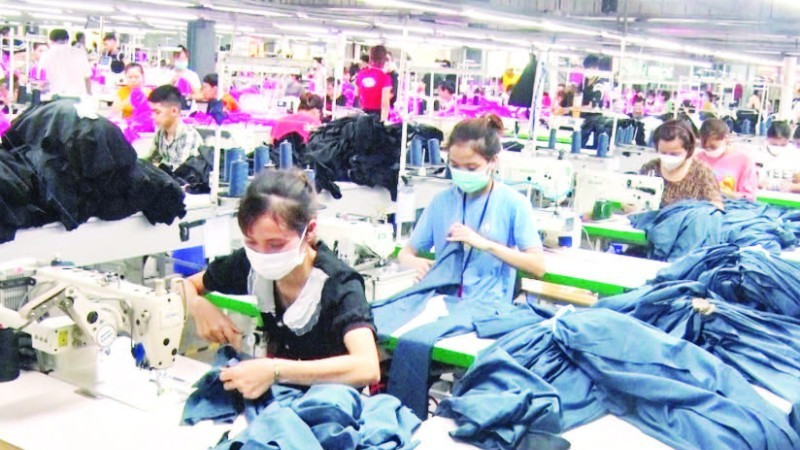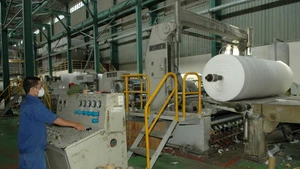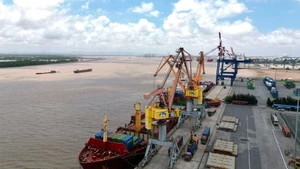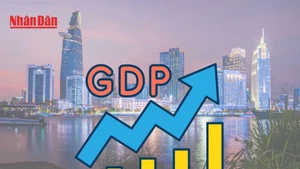Enterprises boldly invest and innovate; the province aims to become a modern industrial province by 2030.
From a province with small-scale production and an economy based mainly on agriculture, Thanh Hoa has now formed many vibrant industrial and service areas, contributing greatly to the overall growth.
Supporting businesses
Le Van Tien, Deputy Director of Thanh Hoa Department of Finance, said that the whole province currently has more than 21,500 operating enterprises, most of which are private enterprises. In 2024, the total product in Thanh Hoa will reach more than 318 trillion VND, of which the private economic sector alone will contribute about 174 trillion VND, accounting for about 55%, creating jobs for hundreds of thousands of workers.
During the recovery period after the COVID-19 pandemic, Thanh Hoa has reviewed and adjusted financial, tax, land and credit mechanisms to be more favourable for businesses; promoted digitalisation of management processes and applied online public services at a high level to shorten the time for processing procedures and reduce informal costs for businesses. The government creates and accompanies, considers businesses as partners in development, while departments and branches proactively guide, advise and accompany in each specific project, not just stopping at the management role.
Nguyen Hong Phong, Vice Chairman of Thanh Hoa Provincial Business Association, assessed: “The administration has accompanied businesses both in words and concrete actions, such as shortening the time for granting investment licenses, improving industrial park infrastructure and production support services. When policies are stable and transparent, businesses dare to invest long-term.”
Nguyen Thi Tham, Director of Tan Tho Handicraft Cooperative, Trung Chinh Commune, shared: “In recent years, thanks to support for digital transformation, product promotion on e-commerce platforms and access to preferential loans, the cooperative has expanded its market to many localities across the country and exported to demanding markets such as Europe and the US, creating stable jobs for more than 40 workers.”
Big enterprises, big aspirations
Not only is the private economic sector a dynamic economic entity, it also makes its mark with strong brands. Deputy General Director of Tien Nong Agricultural Industry Joint Stock Company Cao Trong Tu shared: “From a small facility producing fertilisers for the locality, Tien Nong now has three modern factories with a total capacity of 650,000 tonnes/year, annually supplying an average of more than 8 million bags of fertiliser products to the market, creating jobs for nearly 500 workers.”
Hoang Thi Hoa, a technical staff member of the company, shared: “The job is stable, the income is good, and importantly, I feel like I am contributing to creating real value for farmers and am always proud to see the company’s products present in the countryside.”
Tien Son Thanh Hoa Group Joint Stock Company is also a bright spot in the private economic sector with more than 8,000 employees working in 10 garment factories, with a supply chain extending to the international market. In its development strategy, Tien Son focuses on investing in people and technology, considering this the key to improving productivity, expanding the market and creating different values.
Le Dang Thuyet, Deputy General Director of Tien Son Thanh Hoa Group Joint Stock Company, shared: “We are moving towards in-depth development, innovating the management model, applying digital technology and standardising management capacity according to international standards. Tien Son's goal is not only to be strong in scale, but also strong in quality and professionalism, bringing sustainable value to the business.”
The private business community not only creates jobs and contributes to the budget but also spreads the spirit of innovation and the desire to reach out to the international market. In many new industrial parks, such as Nghi Son, Bim Son, and Lam Son, a series of private projects are being implemented on a large scale. Many new investors have come to Thanh Hoa to seek opportunities, and many local businesses have also begun to reinvest and expand production.
Thanh Hoa is now not only a “production point” in the supply chain but is also seen by businesses as a long-term development centre to build a sustainable value chain. The core factor that makes the breakthrough of Thanh Hoa's private economic sector is the trust in policies and the real support from the government.
When trust is strengthened, businesses will boldly invest, confidently compete, innovate and affirm their position. According to the representative of the Thanh Hoa Department of Finance, the province will continue to promote chain linkages, form supporting industrial-service clusters, synchronously implement financial policies, and coordinate to remove difficulties. The goal is to create a solid foundation for the private economic sector to increasingly contribute to overall growth.
















